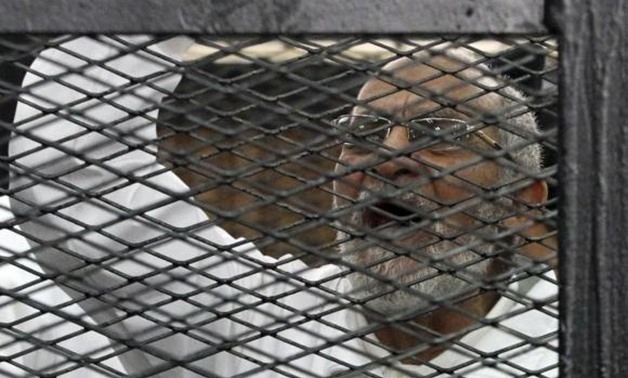
Muslim Brotherhood leader Mohammed Badie shouts slogans from the defendant’s cage during his trial with other leaders of the Brotherhood in a courtroom in Cairo December 11, 2013. Credit: Reuters/Stringer
CAIRO – 22 November 2018: Leader of the intellectual reviews of the Muslim Brotherhood youth in prisons, Amr Abdul-Hafiz, revealed on Thursday that many elements of the Muslim Brotherhood group adopted the ideology of ISIS in prison.
“After five years of dealing with Muslim Brotherhood in prison since the ousting of Mohamed Morsi, I can divide MB members into four sections,” he said revealing that the first section possesses the same ideas and convictions, the second section tends to be more extreme and more violent, the third one started to accept the fact that the group should handle its situation with the government and the fourth wants to get out of prison after repentance.
He said that prisons repress extremists but do not deal with extremism, adding that " extremists may come out after a while, and prisons should turn into hospitals that deal with extremism.”
On September 23, Egypt’s Court of Cassation upheld a court ruling putting prominent Muslim Brotherhood leader and businessman Hassan Malek and 55 other MB members on the list of terrorist entities.
On August 30, Cairo Criminal Court put the MB members on the terrorist list over accusations of damaging the Egyptian economy by smuggling foreign currencies and financially supporting terrorist groups.
In 2015, the attorney general referred Malek and other defendants to the Emergency Court after he was arrested by security forces. Several members of Malek’s family were also added to the terror list endorsed by Cairo Criminal Court in December 2017.
The defendant was born into a Muslim Brotherhood family, but he does not view himself as a leader in the Islamist group, according to Malek's statements during his interrogation by the prosecution. However, in 2006, he was sentenced to seven years in prison for being a leader of the group, which organized a militant-style demonstration at Al-Azhar University at the time.
He was pardoned, along with famous Brotherhood leader and businessman Khairat al-Shater, in March 2011 by the Supreme Council of the Armed Forces.
The businessman’s work was versatile, but mainly revolved around manufacturing/selling conservative attire for women and computers. He is also a business partner of Shater, who intended to run for president in 2012 but was legally excluded due to his 2006 conviction.
Egypt designated the Muslim Brotherhood a terrorist group in 2014.

Comments
Leave a Comment